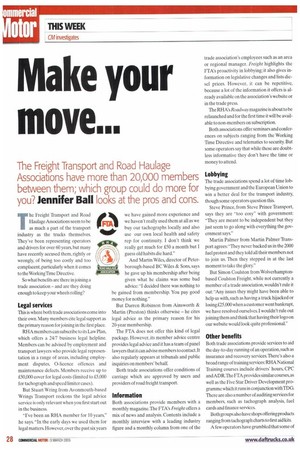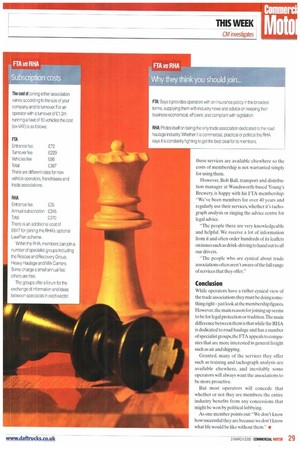Make your move...
Page 28

Page 29

If you've noticed an error in this article please click here to report it so we can fix it.
The Freight Transport and Road Haulage Associations have more than 20,000 members between them; which group could do more for
you? Jennifer Ball looks at the pros and cons.
The Freight Transport and Road Haulage Associations seem to be as much a part of the transport industry as the trucks themselves. They've been representing operators and drivers for over 60 years, but many have recently accused them, rightly or wrongly, of being too costly and too complacent, particularly when it comes to the Working Tune Directive.
So what benefits are there in joining a trade association — and are they doing enough to keep your wheels rolling?
Legal services
This is where both trade associations come into their own. Many members cite legal support as the primary reason for joining in the first place.
RHA members can subscribe to its Law Plan, which offers a 24/7 business legal helpline. Members can be advised by employment and transport lawyers who provide legal representation in a range of areas, including employment disputes, 0-licence offences and maintenance defects. Members receive up to £50,000 cover for legal costs (limited to £5.000 for tachograph and speed limiter cases).
But Stuart Wring from Avorunouth-based Wrings Transport reckons the legal advice service is only relevant when you first start out in the business.
"I've been an RI-IA member for 10 years," he says. "In the early days we used them for legal matters. However, over the past six years we have gained more experience and we haven't really used them at all as we buy our tachographs locally and also use our own local health and safety rep for continuity. I don't think we really get much for £50 a month but I guess old habits die hard."
And Martin Wiles, director of Peterborough-based BC Wiles & Sons, says he gave up his membership after being given what he claims was some bad advice: "I decided there was nothing to be gained from membership. You pay good money for nothing."
But Darren Robinson from Ainsworth & Martin (Preston) thinks otherwise — he cites legal advice as the primary reason for his 20-year membership.
The FTA does not offer this kind of legal package. However, its member advice centre provides legal advice and it has a team of panel lawyers that it can advise members to contact. It also regularly appears at tribunals and public inquiries on members' behalf.
Both trade associations offer conditions of carriage which are approved by users and providers of road freight transport.
Information
Both associations provide members with a monthly magazine. The FTA's Freight offers a mix of news and analysis. Contents include a monthly interview with a leading industry figure and a monthly column from one of the trade association's employees such as an area or regional manager. Freight highlights the FTA's proactivity in lobbying; it also gives information on legislative changes and lists diesel prices. However, it can be repetitive, because a lot of the information it offers is already available on the association's website or in the trade press.
The RHA's Roadway magazine is about to be relaunched and for the first time it will be available to non-members on subscription.
Both associations offer seminars and conferences on subjects ranging from the Working Time Directive and telematics to security. But some operators say that while these are doubtless informative they don't have the time or money to attend.
Lobbying
The trade associations spend a lot of time lobbying government and the European Union to win a better deal for the transport industry, though some operators question this.
Steve Prince, from Steve Prince Transport, says they are "too cosy" with government: "They are meant to be independent but they just seem to go along with everything the government says."
Martin Palmer from Martin Palmer Transport agrees: "They never backed us in the 2000 fuel protest and they told all their members not to join us. Then they stepped in at the last moment to take the glory."
But Simon Coulston from Wolverhamptonbased Coulston Freight, while not currently a member of a trade association, wouldn't rule it out: "Any issues they might have been able to help us with, such as having a truck hijacked or losing £25,000 when a customer went bankrupt, we have resolved ourselves. I wouldn't rule out joining them and think that having their logo on our website would look quite professional."
Other benefits
Both trade associations provide services to aid the day-to-day running of an operation,such as insurance and recovery services. There's also a broad range of training services: RHA National Training courses include drivers' hours, CPC and ADR.The FTA provides similar courses, as well as the Five Star Driver Development programme which it runs in conjunction withTDG. There are also a number of auditing services for members, such as tachograph analysis, fuel cards and finance services.
Both groups also have shops offering products ranging from tachograph charts to first aid kits. A few operators have grumbled that some of these services are available elsewhere so the costs of membership is not warranted simply for using them.
However, Bob Ball, transport and distribution manager at Wandsworth-based Young's Brewery, is happy with his FTA membership: "We've been members for over 40 years and regularly use their services, whether it's tachograph analysis or ringing the advice centre for legal advice.
"The people there are very knowledgeable and helpful. We receive a lot of information from it and often order hundreds of its leaflets on issues such as drink-driving to hand out to all our drivers.
"The people who are cynical about trade associations often aren't aware of the full range of services that they offer."
Conclusion
While operators have a rather cynical view of the trade associations they must be doing something right —just look at the membership figures. However, the main reason for joining up seems to be for legal protection or tradition.The main difference between them is that while the RI-IA is dedicated to road haulage and has a number of specialist groups, the FTA appeals to companies that are more interested in general freight such as air and shipping.
Granted. many of the services they offer such as training and tachograph analysis are available elsewhere, and inevitably some operators will always want the associations to be more proactive.
But most operators will concede that whether or not they are members. the entire industry benefits from any concessions that might be won by political lobbying.
As one member points out: "We don't know how successful they are because we don't know what life would be like without them." •










































































































































































































